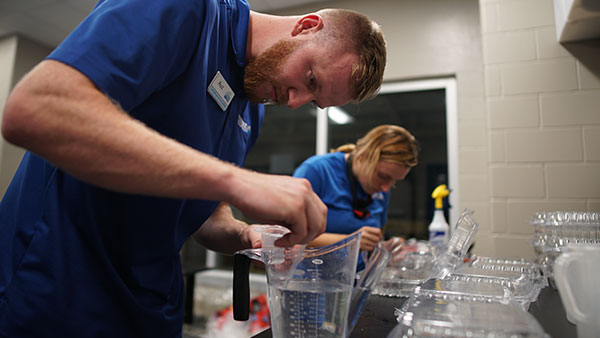The Journey Begins: A Promising Partnership to Protect and Restore Keys’ Reefs
Coral Scientists at The Florida Aquarium continue to work tirelessly since successfully spawning threatened Atlantic pillar coral in August. These scientists were the first to reproduce Atlantic corals through lab-induced techniques. Their efforts have ignited hope for a new path to help vulnerable coral reefs.
The Florida Aquarium is taking another step towards a brighter future to save our dying reefs by joining the National Oceanic and Atmospheric Administration (NOAA) and local partners to announce the first high-level bold strategy to protect and restore seven coral reef sites in the Florida Keys, part of an unprecedented, decades-long effort to revitalize the region’s highly diverse and economically valuable marine ecosystem.
Since the 1970s, hurricanes, heat-induced coral bleaching, cold snaps, and disease events, as well as acute impacts such as ship groundings, prop scarring, and misused boat anchors, have reduced coral cover in the Florida Keys by more than 90 percent. Coral cover is a measure of the proportion of reef surface covered by live stony coral instead of sponges, algae, or other organisms. In general, 25 percent of coral cover is considered necessary to support a healthy ecosystem and protect the reef structure.
The NOAA-led “Mission: Iconic Reefs” coral reef restoration initiative announcement was made today during a press event in Key Largo, Florida. The project, “Mission: Iconic Reefs,” calls for restoration of nearly three million square feet of the Florida Reef Tract — about the size of 52 football fields — and is estimated to cost $100 million over the first decade, one of the largest investments ever undertaken in coral restoration. Over the next year, NOAA will focus on available funding to support this effort and work with outside partners to secure additional public and private funds.
“This restoration strategy is essential to the survival of our Florida Reef Tract and could not be accomplished without the collaboration of the state’s coral partners,” said Dr. Amber Whittle, The Florida Aquarium Director of Conservation. “The Florida Aquarium is in a unique position to produce genetically diverse, adaptable corals and long-spined sea urchins to aid in this vital restoration.”
The team of coral scientists at The Florida Aquarium will continue to pinpoint the optimal environmental cues to trigger spawning in our Project Coral program to induce the corals to reproduce more than once a year. These corals will be used in the “Mission: Iconic Reefs” project, a multi-partner coral reef restoration initiative.
Also, in partnership with the University of Florida’s Institute of Food and Agricultural Sciences (UF/IFAS), are spawning and breeding long-spined urchins for coral reef herbivore restoration, which will also be used in the “Mission: Iconic Reefs” project.
Also, in partnership with the University of Florida’s Institute of Food and Agricultural Sciences (UF/IFAS), are spawning and breeding long-spined urchins for coral reef herbivore restoration, which will also be used in the “Mission: Iconic Reefs” project.
Collaboration among federal and state agencies, leading coral reef experts, local restoration practitioners, and the Florida Keys community will be vital to the success of this ambitious effort. Partners include the State of Florida, Coral Restoration Foundation, Mote Marine Laboratory and Aquarium, Florida Aquarium, The Nature Conservancy, Reef Renewal, and the National Marine Sanctuary Foundation.





